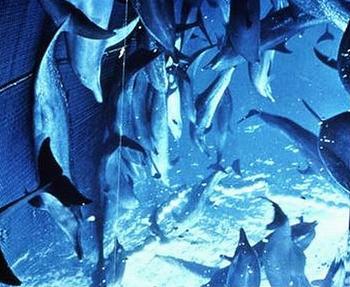
NEW YORK, New York, January 9, 2015 (ENS) – In a landmark settlement with three environmental groups, the U.S. government has agreed to adopt new rules that ensure seafood imported into the United States meets high standards for protecting whales and dolphins.
The plaintiffs: Center for Biological Diversity, Turtle Island Restoration Network and the Natural Resources Defense Council – nonprofit groups representing a total of more than two million people – won Monday’s settlement in the U.S. Court of International Trade in New York.
The Court of International Trade, established under Article III of the U.S. Constitution, has nationwide jurisdiction over civil actions arising out of the customs and international trade laws of the United States.

“The new regulations will force other countries to step up and meet U.S. conservation standards – saving hundreds of thousands of whales and dolphins from dying on hooks and in fishing nets around the world,” said Sarah Uhlemann, senior attorney and international program director of the Center for Biological Diversity. “The U.S. government has finally recognized that all seafood consumed in the United States must be ‘dolphin-safe.’ ”
Each year more than 650,000 whales, dolphins and other marine mammals are caught and killed in fishing gear somewhere in the world. These animals are unintentional “bycatch” of commercial fisheries.
Whales and dolphins become entangled in tuna nets; they are then crushed and killed in the net-pulling winches of the fishing boats. Or they drown in the
nets or are tossed overboard to die from their injuries.
Despite U.S. efforts to protect marine mammals in its own waters, fishing gear continues to pose the biggest threat to whale and dolphin conservation worldwide, the groups maintain.
“It’s time to do what it takes to save thousands of whales and dolphins around the world, and hold our fish imports to the same standards that we require of our U.S. fishermen,” said Zak Smith with the Natural Resources Defense Council. “This law will help do that. It provides real, enforceable protections for marine mammals and sets up an even playing field that allows our fishermen to be competitive in the U.S. market.”

The rules implement a 40-year-old provision of the Marine Mammal Protection Act that prohibits the United States from allowing seafood to enter the country unless it meets U.S. whale and dolphin standards.
Under the Court of International Trade settlement, the U.S. government must make a final decision by August 2016 about how to implement this requirement and end unlawful fish imports.
“If we’d had these standards 40 years ago, we wouldn’t be scrambling today to save the imperiled vaquita. Thankfully, if this law is implemented, other species won’t share their fate,” said Smith.
The vaquita, the world’s smallest porpoise, is being driven extinct by shrimp gillnets in Mexico’s Gulf of California. Fewer than 100 vaquita remain.
Under the new regulations, shrimp from this region would be barred from entering the United States as it does not meet the more protective U.S. marine mammal protection standards.
These standards may include modifying gear and closing fishing in some areas to limit the risk of entanglement of whales and dolphins in fishing nets.
“The public demands and the U.S. can – and by law, must – wield its tremendous purchasing power to save dolphins and whales from foreign fishing nets,” said Todd Steiner, biologist and executive director of Turtle Island Restoration Network. “We have the right to ensure that the seafood sold in the U.S. is caught in ways that minimize the death and injury of marine mammals.”
Americans consume five billion pounds of seafood per year, including tuna, swordfish, shrimp and cod. About 90 percent of that seafood is imported and about half is wild-caught.
Copyright Environment News Service (ENS) 2015. All rights reserved.
